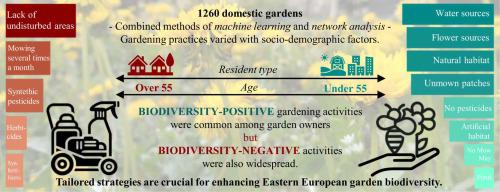当前位置:
X-MOL 学术
›
Urban Forestry Urban Green.
›
论文详情
Our official English website, www.x-mol.net, welcomes your feedback! (Note: you will need to create a separate account there.)
Bridging biodiversity and gardening: Unravelling the interplay of socio-demographic factors, garden practices, and garden characteristics
Urban Forestry & Urban Greening ( IF 6.0 ) Pub Date : 2024-05-15 , DOI: 10.1016/j.ufug.2024.128367 Zsófia Varga-Szilay , Kinga Gabriela Fetykó , Gergely Szövényi , Gábor Pozsgai
Urban Forestry & Urban Greening ( IF 6.0 ) Pub Date : 2024-05-15 , DOI: 10.1016/j.ufug.2024.128367 Zsófia Varga-Szilay , Kinga Gabriela Fetykó , Gergely Szövényi , Gábor Pozsgai

|
The expansion of urban areas threatens biodiversity and disrupts ecological relationships, thereby impeding key ecosystem services. To avert irreversible consequences, there is a focus on improving the biodiversity value of domestic gardens. We employ machine learning and network analysis and examine gardening practices and garden owners’ environmental consciousness in Hungary through a questionnaire-based study to untangle the interplay among socio-demographic factors, garden management and -characteristics. We found that the activities determined as biodiversity-positive were widespread among respondents, but ubiquitous pesticide use (62.14%), lack of undisturbed areas (49.52%), and frequent mowing (32.06%) were also present. Middle-aged respondents demonstrated more biodiversity-supporting activities than those over 55, who had long-term gardening experience and were predominantly conventional gardeners. Respondents of towns showed the least biodiversity-positive activities, whereas those living in cities and the countryside fared better. Additionally, multiple interconnected garden characteristics revealed various types of gardens distinguished by care practices and use, such as gardens for food self-provisioning, ornamental gardens, or those prioritizing biodiversity support. Our results show that garden owners use pesticides independently of socio-demographic parameters, gardening practices, or garden characteristics, suggesting widespread pesticide use in Hungary. Our findings suggest that strategies to promote biodiversity-friendly gardening may not be equally suitable for all gardener owners with different cultural backgrounds, environmental consciousness and gardening habits. Factors like differences between societal groups underscore the preference for in-person programs over online information transfer in several cases, for instance, among the elderly and those living in the countryside. We offer fresh perspectives on the intricate connections between garden diversity, characteristics, and practices, and it lays the groundwork for future research into the sociological drivers of gardening practices in Eastern Europe. Our work emphasises that optimizing gardens for multiple ecosystem services, including biodiversity conservation and enhancing human well-being, requires a nuanced understanding of both ecological and socio-demographic factors.
中文翻译:

连接生物多样性和园艺:揭示社会人口因素、花园实践和花园特征之间的相互作用
城市地区的扩张威胁到生物多样性并破坏生态关系,从而阻碍关键的生态系统服务。为了避免不可逆转的后果,重点是提高家庭花园的生物多样性价值。我们采用机器学习和网络分析,通过基于问卷的研究来调查匈牙利的园艺实践和花园业主的环境意识,以理清社会人口因素、花园管理和特征之间的相互作用。我们发现,被确定为对生物多样性有益的活动在受访者中很普遍,但也存在普遍使用农药(62.14%)、缺乏未受干扰的区域(49.52%)和频繁割草(32.06%)的情况。中年受访者比 55 岁以上的受访者表现出更多的生物多样性支持活动,后者拥有长期园艺经验并且主要是传统园丁。城镇受访者表现出的生物多样性积极活动最少,而居住在城市和农村的受访者表现较好。此外,多个相互关联的花园特征揭示了各种类型的花园在护理实践和用途方面的区别,例如自给自足食物的花园、观赏花园或优先考虑生物多样性支持的花园。我们的研究结果表明,花园所有者使用农药的方式与社会人口参数、园艺实践或花园特征无关,这表明匈牙利广泛使用农药。我们的研究结果表明,促进生物多样性友好型园艺的策略可能并不同样适合所有具有不同文化背景、环境意识和园艺习惯的园丁业主。 社会群体之间的差异等因素突显了在某些情况下(例如老年人和农村居民)对面对面项目而非在线信息传输的偏好。我们对花园多样性、特征和实践之间错综复杂的联系提供了新的视角,并为未来研究东欧园艺实践的社会学驱动因素奠定了基础。我们的工作强调,优化花园以提供多种生态系统服务,包括生物多样性保护和提高人类福祉,需要对生态和社会人口因素有细致入微的了解。
更新日期:2024-05-15
中文翻译:

连接生物多样性和园艺:揭示社会人口因素、花园实践和花园特征之间的相互作用
城市地区的扩张威胁到生物多样性并破坏生态关系,从而阻碍关键的生态系统服务。为了避免不可逆转的后果,重点是提高家庭花园的生物多样性价值。我们采用机器学习和网络分析,通过基于问卷的研究来调查匈牙利的园艺实践和花园业主的环境意识,以理清社会人口因素、花园管理和特征之间的相互作用。我们发现,被确定为对生物多样性有益的活动在受访者中很普遍,但也存在普遍使用农药(62.14%)、缺乏未受干扰的区域(49.52%)和频繁割草(32.06%)的情况。中年受访者比 55 岁以上的受访者表现出更多的生物多样性支持活动,后者拥有长期园艺经验并且主要是传统园丁。城镇受访者表现出的生物多样性积极活动最少,而居住在城市和农村的受访者表现较好。此外,多个相互关联的花园特征揭示了各种类型的花园在护理实践和用途方面的区别,例如自给自足食物的花园、观赏花园或优先考虑生物多样性支持的花园。我们的研究结果表明,花园所有者使用农药的方式与社会人口参数、园艺实践或花园特征无关,这表明匈牙利广泛使用农药。我们的研究结果表明,促进生物多样性友好型园艺的策略可能并不同样适合所有具有不同文化背景、环境意识和园艺习惯的园丁业主。 社会群体之间的差异等因素突显了在某些情况下(例如老年人和农村居民)对面对面项目而非在线信息传输的偏好。我们对花园多样性、特征和实践之间错综复杂的联系提供了新的视角,并为未来研究东欧园艺实践的社会学驱动因素奠定了基础。我们的工作强调,优化花园以提供多种生态系统服务,包括生物多样性保护和提高人类福祉,需要对生态和社会人口因素有细致入微的了解。











































 京公网安备 11010802027423号
京公网安备 11010802027423号